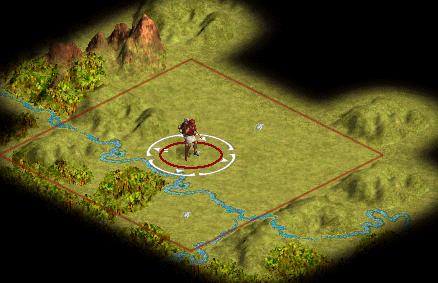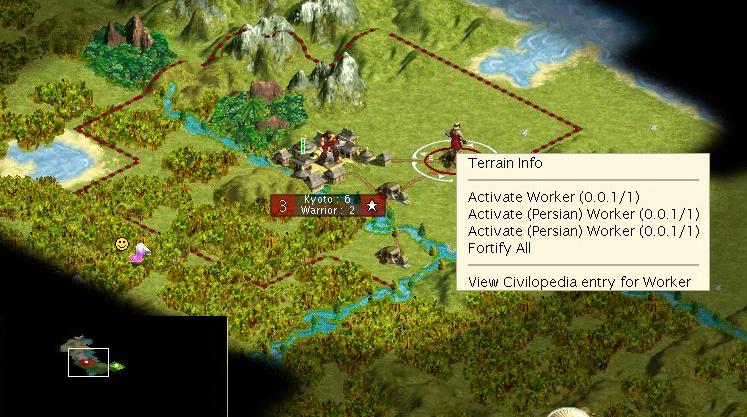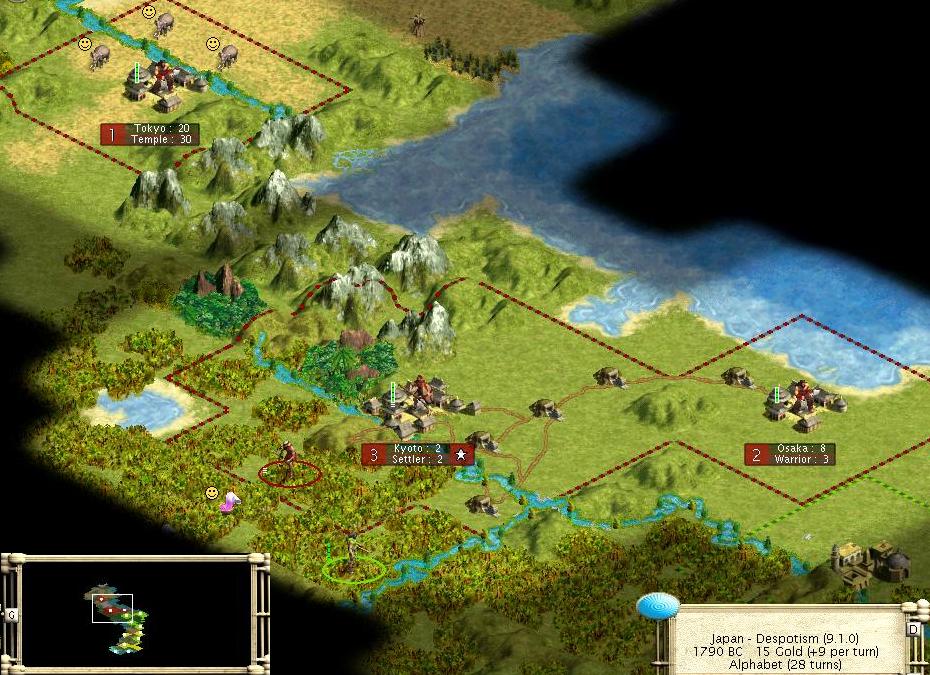

Back in July when Epic4 concluded, there was some discussion about what the next Deity game should be like. Epic4 had its barbarian theme but still played under normal conditions, so it looked like it would be a good idea to run the next one under slightly different settings. I suggested that we run a game based under the same conditions as Sirian's one called "To the Bitter End", that being a game on Deity with only Conquest enabled as a victory condition. Somewhat counterintuitively this actually makes for an easier game for the player, as there is no need to worry about losing a space race. Of course the world is also a pretty big place, and beating Deity AI civs is no piece of cake, so the game would hardly be a walk in the park. There was considerable interest for the idea, and Arathorn was gracious enough to sponsor the game by providing us with a map and the Japanese as a civ. As one who had pushed for this game, I could hardly not play it, right? ;)

Well, the starting position wasn't that bad at first glance. On a river, bonus grasslands for early use, some grasslands and hills/mountains for future potential... Yes, there was the makings for a very nice city here. Not wanting to waste a bonus grassland, and fearing that my capital might one day be attacked, I decided to move the settler a tile NW onto the hill, where I founded Kyoto in 3950BC. As it frequently does, this would have a significant effect on my game.
The first build choice was two warriors, for scouting/defense. I sent the first warrior to the east, since I could see only jungle and mountains in the other directions. In 3450BC I met the Persians - right on the doorstep of my capital. They could have simply crushed my one warrior and killed me, but naturally the AI is not that aggressive (whew). I made a big deal immediately in this game: the Wheel and Ceremonial Burial went to Persia in exchange for Masonry, 35g, and a worker. Yes, a worker. This was played out before the big discussion we had during the Epic8 results and was thus before I agreed that worker buying before 2000BC was a big no-no. I wasn't really even thinking about it; when I contacted Persia for the first time they already had a worker in their capital, so naturally I bought it. I wouldn't do that now of course, but I couldn't go back and change my game when the issue came up about a week later. To make matters worse, on the very next turn (3400BC) I bought a second worker from Persia using the 35g I had just received. Very, very bad for comparing game results. We will have to see if my Persia was crippled compared to those in other games, and my observations tell me that mine was weaker than it should have been. :(
In 3150BC my warrior that was scouting met up with the Egyptians. That meant that two civs were very close to me - should make for an interesting game, I thought. Meeting them also dropped my research time on Pottery so that I received it on the next turn, which was nice. I had been prebuilding a granary with a barracks after building the first two warriors, so I switched to that afterwards. I don't know when the granary completed, but the first settler after that came out around 2600BC. Here's a picture from 2750BC showing where I had scouted and my progress to that dates (as well as the presence of the notorious Persian workers.)

It seems I had one warrior scouting in each direction, so I must have built three at some point in time. I suppose I was playing it a bit more conseratively with the farmer's gambit due to the closeness of Persia and Egypt. The land around me wasn't very good, for the most part. To the east was the ocean, with enough room for one fishing town there. To the south and west were large jungles, which of course have plenty of potential but are not the best thing to draw with a non-industrious civ. The fact that Persia and Egypt were both industrious civs did not make things any better. And of course the other civs seemed to be to the south as well. The north had the most promise, with a slew of plains and a great deal of ivory. I made getting up there and securing that land a high priority.
In 2430BC I discovered why Persia had had two workers in their capital: they were at war with Egypt! And apparently had been so for some time, at that. What a great break for me, as they wasted their free early units in a pointless war that would slow their expansion - well, at least a little. Sometime around this point I also met the Chinese, who were south and west of the Egyptians. Oh great - ANOTHER industrious civ! Not to mention the fact that all three of the civs also have very, very good UUs that come into play early in the game. Arathorn gave us a good game here all right - it would take skill to find a way out of this setup.
I had discovered a nice site for my second city, right on a hill on the river to the SE of Kyoto. It would allow me to have a strong city and greatly limit Persian expansion towards me, while also likely setting up more excellent locations on the coast to the north and south. But 2 turns before I got there, the Persians founded a city on that exact spot - exactly the two turns extra it took me to move there because my initial move with the first settler was to a tile NW. If I had moved the other direction on the river... I wonder how my game would have gone. I had to settle for a much poorer location on the coast, not getting it until 2270BC, and lacking that location would haunt me for the rest of the game. It turned out to have both horses AND iron, to add insult to injury. Them's the breaks sometimes.
My second settler headed north to claim the ivory, and didn't reach that location until 1790BC. What a slow start here: no second city until 2270BC, no third city until 1790BC, and that one far enough away to be pretty heavily corrupted under despotism. It was not my best start. But my fourth settler claimed all four dyes that were lined up in a row in the jungle, and ensured that my position wouldn't be completely helpless. My map from 1790BC, with comments to follow:

Osaka was clearly in a less than optimal location, but moving it further would have been a very bad idea as every turn spent before founding a second city is another turn lost in terms of overall civ development. It would have to do, though it never became a truly strong city. The offending Persian city can be seen in the bottom right corner of the screen. Tokyo was there to get the ivory, plain and simple, but as it became more and more likely that there were no more civs on my island (on Deity they find you, not the other way around) I began to think about turning it into a second core area. My next city went to the west, and claimed the dyes that are on the screen plus three others. It should also be noticed how many tile improvements my workers had put up already; definitely an argument for why worker purchases should be disallowed.
On the whole, it was a rather disappointing start. I didn't grab all that much land and what I did grab wasn't that good. But with tons of military units flying around (I know the screenies don't show that, but they were moving around me all the time) I had to play it a bit more conservatively than I would have otherwise. The fact that everyone was right next to one another similarly meant that I was unable to get anything out of map brokering when MapMaking was discovered. Other things, like the fact that I had several luxuries, boded well for the future. But it was still a frustrating start for the most part, and I had to hope that things would improve if I were to be in a position to conquer everyone else.






